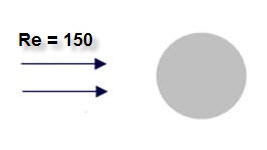| Panel |
|---|
| Wiki Markup |
| {panel}
Author: Rajesh Bhaskaran & Yong Sheng Khoo, Cornell University {color:#ff0000}{*}Problem Specification{*}{color} [1. Create Geometry in GAMBIT|FLUENT - Unsteady Flow Past a Cylinder - Step 1] [2. Mesh Geometry in GAMBIT|FLUENT - Unsteady Flow Past a Cylinder - Step 2] [3. Specify Boundary Types in GAMBIT|FLUENT - Unsteady Flow Past a Cylinder - Step 3] [4. Set Up Problem in FLUENT|FLUENT - Unsteady Flow Past a Cylinder - Step 4] [5. Solve\!|FLUENT - Unsteady Flow Past a Cylinder - Step 5] [6. Analyze Results|FLUENT - Unsteady Flow Past a Cylinder - Step 6] [7. Refine Mesh|FLUENT - Unsteady Flow Past a Cylinder - Step 7] {panel} h2. Problem Specification !unsteadyCylinder.jpg! The purpose of this tutorial is to illustrate the setup and solution of an unsteady flow past a circular cylinder and to study the vortex shedding phenomenon. Flow past a circular cylinder is one of the classical problems of fluid mechanics. For this problem, we will be looking at Reynolds number of 150. {latex}\gamma \_1 = \frac{{\mu \_3 }}{{\mu \_2 \^{{3 \mathord{\left/ {\vphantom {3 2}} \right. \kern-\nulldelimiterspace} 2}} }} = \frac{{\mu \_3 }}{{\sigma \^3 }}{latex} Re = ρVD/μ We know D = 2 m. To obtain _Re_ = 150, we can arbitrarily set ρ, _v_ and μ. For our case, let's set ρ = 75 kg/m ^3^ , _v_ = 1 m/s and μ = 1 kg/ms. \\ h2. Preliminary Analysis For _Re_ = 150, we are looking at unsteady flow with periodic vortex shedding. What will be the shedding frequency of this flow? How will the vortex shedding looks like? Let's start the modeling in our quest to find out the answer\! We'll create the geometry and mesh in GAMBIT which is the preprocessor for FLUENT, and then read the mesh into FLUENT and solve for the flow solution. *[*Go to Step 1: Create Geometry in GAMBIT*|FLUENT - Unsteady Flow Past a Cylinder - Step 1]* [See and rate the complete Learning Module|FLUENT - Unsteady Flow Past a Cylinder] [Go to all FLUENT Learning Modules|FLUENT Learning Modules]University Problem Specification |
Problem Specification
The purpose of this tutorial is to illustrate the setup and solution of an unsteady flow past a circular cylinder and to study the vortex shedding phenomenon. Flow past a circular cylinder is one of the classical problems of fluid mechanics. For this problem, we will be looking at Reynolds number of 150.
\gamma _1 = \frac{{\mu _3 }}\mu _2 ^{{3 \mathord{\left/ {\vphantom {3 2 \right. \kern-\nulldelimiterspace} 2}} }} = \frac{{\mu _3 }}{{\sigma ^3 }}
Re = ρVD/μ
We know D = 2 m. To obtain Re = 150, we can arbitrarily set ρ, v and μ. For our case, let's set ρ = 75 kg/m 3 , v = 1 m/s and μ = 1 kg/ms.
Preliminary Analysis
For Re = 150, we are looking at unsteady flow with periodic vortex shedding. What will be the shedding frequency of this flow? How will the vortex shedding looks like?
Let's start the modeling in our quest to find out the answer!
We'll create the geometry and mesh in GAMBIT which is the preprocessor for FLUENT, and then read the mesh into FLUENT and solve for the flow solution.
Go to Step 1: Create Geometry in GAMBIT
 Sign-up for free online course on ANSYS simulations!
Sign-up for free online course on ANSYS simulations!